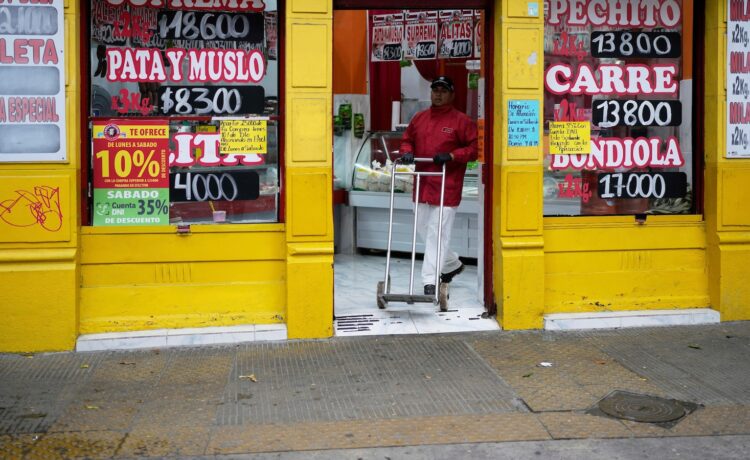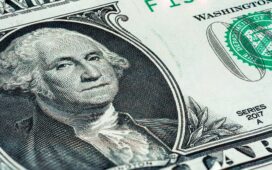BUENOS AIRES, Argentina — The libertarian government of President Javier Milei on Friday announced that it would lift most of the country’s strict capital and currency controls next week, a high-stakes gamble made possible by a new loan from the International Monetary Fund.
In a nationally televised address, Economy Minister Luis Caputo said the IMF’s executive board had decided to approve the $20 billion bailout package announced earlier this week, which offers a lifeline to Argentina’s dangerously depleting foreign currency reserves.
“The agreement will allow us, starting Monday, to lift the exchange rate controls that so severely limit the normal functioning of the economy,” Caputo said from the government headquarters in Buenos Aires. “Investments that are currently pending will begin to come into Argentina to take us to this new stage.”
The capital controls, known here as “el cepo,” or “the trap, ” are a tangle of regulations that help to stabilize the peso at an official rate and prevent capital flight from Argentina.
Imposed by a previous administration in 2019, the restrictions curb individuals’ and companies’ access to dollars, discouraging the foreign investment that Milei needs to achieve his goal of transforming heavily regulated Argentina into a free economy. The restrictions have given rise to a black market exchange rate for dollars that is technically illegal but that almost every Argentine uses to sell their depreciating pesos anyway.
Caputo said the central bank would receive $12 billion from the IMF on Tuesday — a bigger-than-expected upfront sum that gives Argentina’s reserves breathing room to make the major change and reflects the fund’s confidence in Milei’s radical reforms.
“The Fund told us that what we’d done was practically impossible,” Caputo said.
The new policy also involves cutting the Argentine peso free from its peg to the dollar and letting it trade within a so-called currency band that ranges from 1,000 to 1,400 pesos per dollar. The band will expand 1% each month, the bank said.
This breaks from Milei’s current policy of letting the peso weaken at a pace of just 1% per month against the dollar. The crawling peg has faced backlash from investors concerned about the government burning through its reserves to prop up the peso and from business leaders upset that a strong peso was hurting the competitiveness of their exports and widening the country’s trade balance. It also has made Argentina much more expensive in dollar terms.
Milei has sought to fend off a politically costly official devaluation, which sparks inflation. Keeping a lid on rising prices — a flagship campaign promise — has helped him hold up approval ratings despite his brutal cuts to state spending that might otherwise trigger social unrest.
“A big question mark is inflation in the second quarter of the year. It’s very likely there will be a shock,” said Leonardo Piazza, chief economist at Argentine consulting firm LP Consulting.
The announcement came as the IMF’s executive board was preparing to approve the new $20 billion loan with Argentina, the 23rd rescue package in the nation’s long and tumultuous history. The South American nation is already the IMF’s biggest debtor, owing some $43 billion.
After the unusually large first $12 billion disbursement from the IMF hits Argentina’s central bank Tuesday, another $2 billion will arrive in the next two months, the government said. International organizations like the World Bank will contribute several billion more dollars as part of the deal.
Before Milei took office in December 2023, the previous left-wing Peronist administration ran up massive budget deficits, leading to sky-high inflation and a chronically weakening peso.
By scrapping subsidies and price controls, firing tens of thousands of state workers and halting the central bank’s reckless money-printing, Milei has delivered Argentina’s first fiscal surplus in years and largely stabilized its macroeconomic imbalances, thrilling markets even as his shock-therapy approach has hit the population hard.
Yet for all the changes, there have been scant signs of a sustainable economic recovery — involving the removal of capital controls, the amassing of currency reserves and access to international capital markets. Despite an incentive scheme, foreign investors remained wary of pouring their cash into a country infamous for defaulting on its debt.
Milei has long described lifting the controls as an important goal, but said the economic conditions needed to be right. It’s a high-risk mission, as scrapping the “cepo” could unleash years of pent-up demand for U.S. dollars and spark a currency run as companies try to send their long-trapped profits home.
“It could be a tsunami of money out,” said Christopher Ecclestone, a strategist with investment bank Hallgarten & Company. “It’s a total guessing game as to what people will do.”
As a result, the government said that while it was lifting restrictions for individuals, it would retain some regulations for companies. Capital flight could imperil his primary accomplishment of lowering inflation ahead of crucial midterm elections in October in which his libertarian party hopes to expand its small congressional minority.
“The announcement is more audacious than expected. The government is making a bit of a leap of faith by lifting the cepo,” said Marcelo J. García, director for the Americas at New York-based geopolitical risk consultancy Horizon Engage. “It is bolder than one could have imagined at the start of an electoral year.”
As uncertainty over the IMF deal spread jitters among investors, the closely watched gap between the parallel black market rate and the official exchange rate widened by over 20% in recent week, with the black market rate dropping to 1,350 pesos per dollar and the official rate currently hovering just over 1,100.
García said he expects an initial devaluation of around 20-25% for the government let the peso float — or, rather, sink — against the U.S. dollar and move within the currency band of 1,000-1,400.
An abrupt devaluation would increase price pressures at a time when Milei’s progress against inflation stalls.
On Friday, Argentina’s National Statistics Institute, or INDEC, reported that monthly inflation had accelerated in March to its fastest pace in seven months, with consumer prices up 3.7% compared to 2.4% in February, mainly as a result of rising food prices.
___
Associated Press writer Almudena Calatrava contributed to this report.




